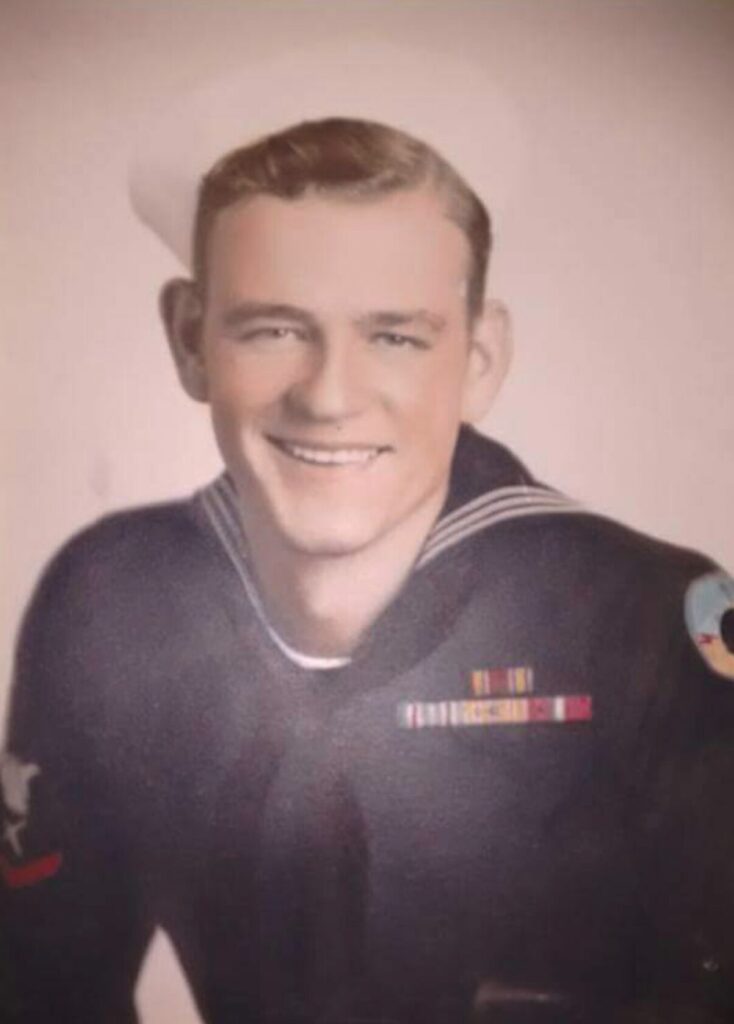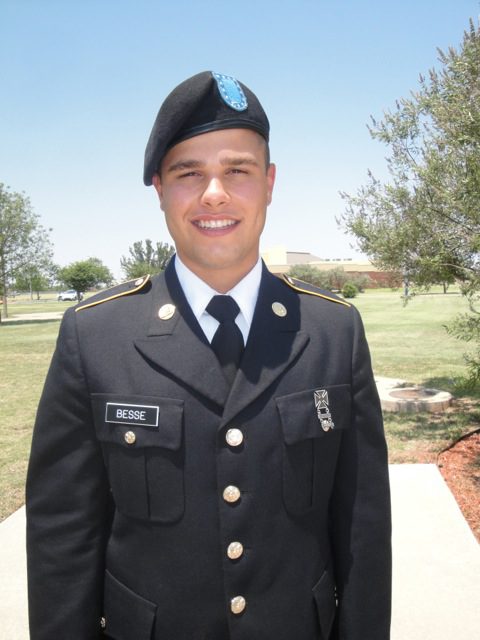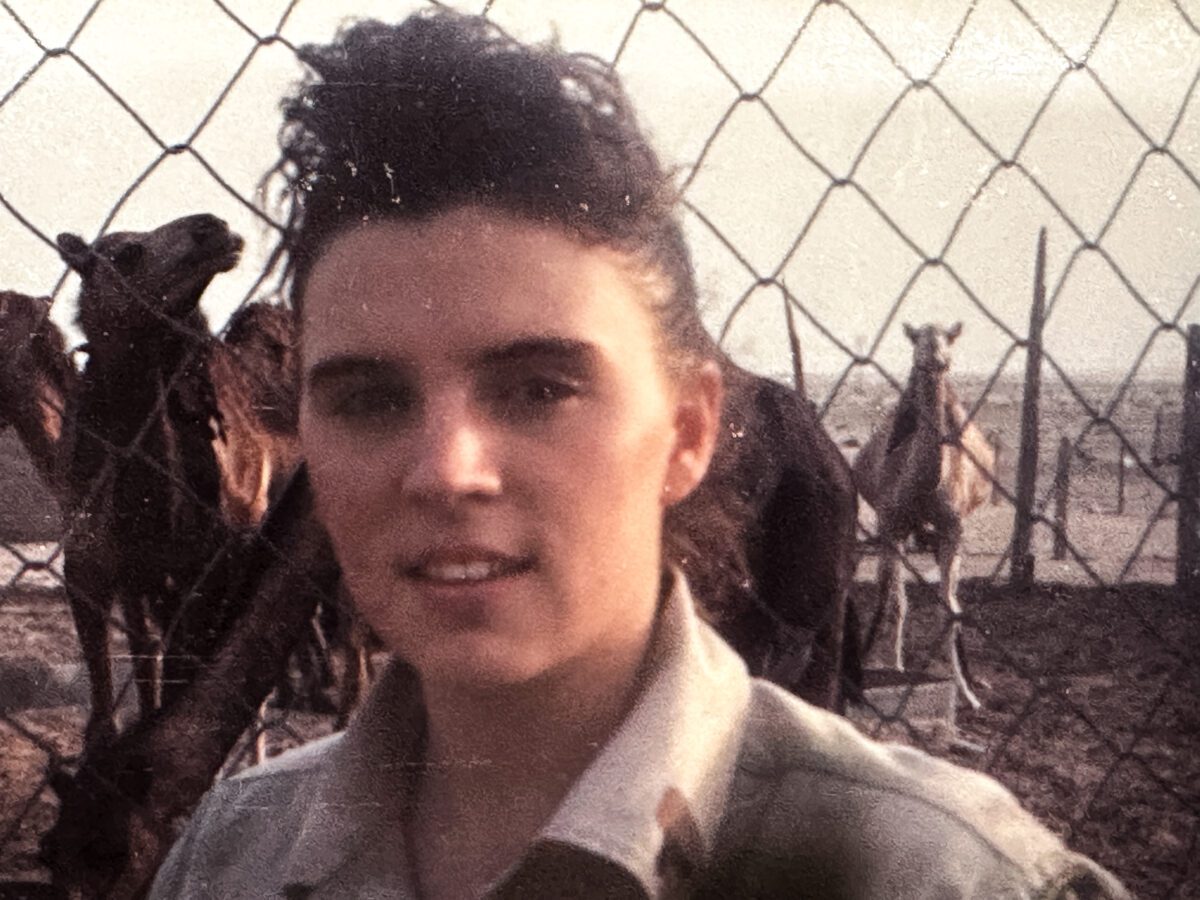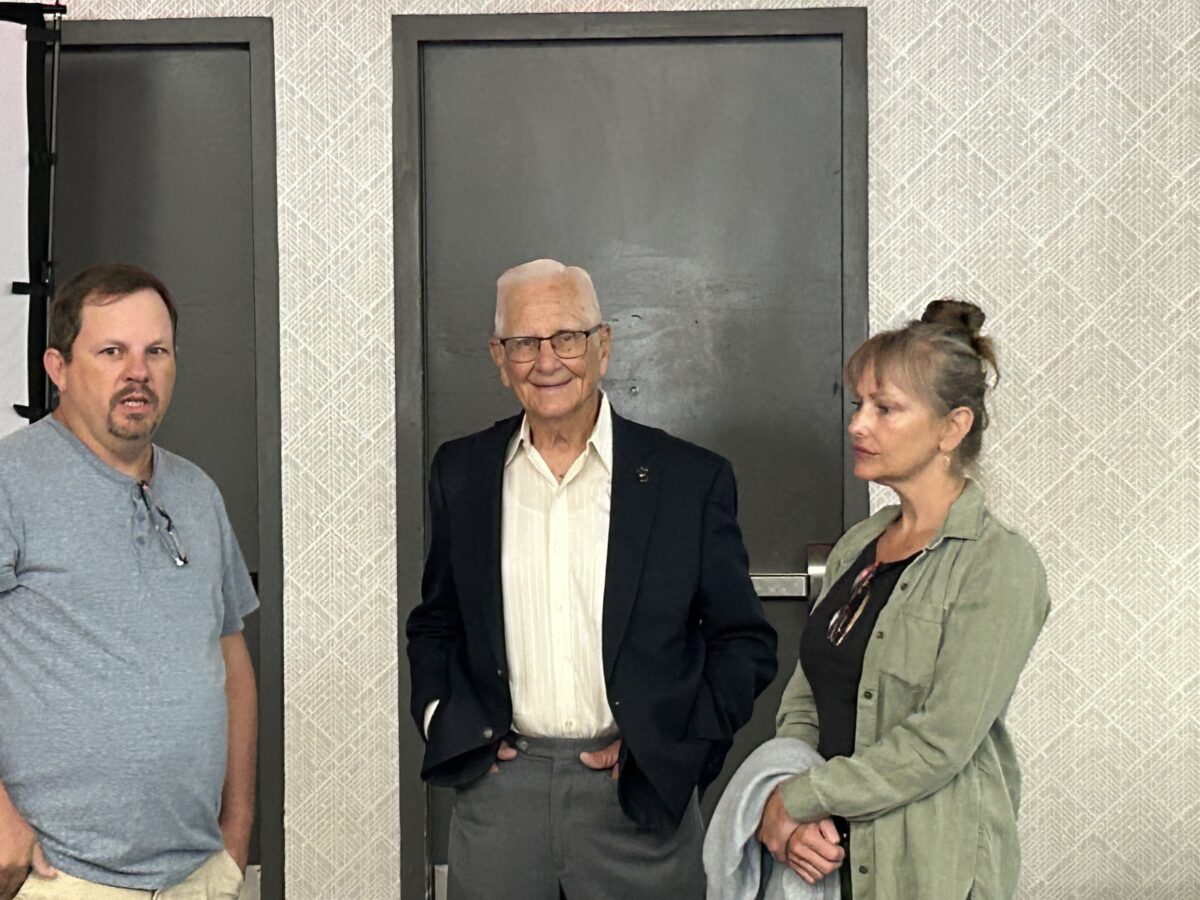
Wayne Webster
World War II – Navy
Before he went off to fight in World War II, U.S. Navy veteran Wayne Webster says he “did not know there was a town bigger than McAlester.”
“My life began when I went into the service,” says Webster, a Sand Springs resident who celebrated his 99th birthday this year. “The rest of it was nothing but work and plowing and raising cotton and corn.”
Webster suffered his share of deprivations as a child, but notes that “we weren’t the only ones.” His family lived for a while in a farmhouse with no running water or utilities. He was four when an older brother died, and his mother died when he was seven.
He enlisted in the Navy in 1943, “just before they drafted me,” and served as a gunner’s mate on AM 296, an auxiliary mine sweeper. Webster’s ship took part in eleven World War II invasions in the Philippines, and four in Borneo.
“We had a pretty good crew,” he says. “Ninety percent, at least, were under 19 years old.”
There were many close calls, which Webster can recall in detail.
“There was a four-engine bomber that dropped two at us,” he shares. “We heard them whistling coming down.” Both bombs narrowly missed the ship.
A senior officer once scolded him because he had gone six months without writing to his father.
“I said to him, ‘What can I write? I can’t tell him where we have been, where we are going, where we are, you can’t even discuss the weather.’”
Webster says about the only thing he could tell his dad was that he was OK, to which the officer “looked me right in the eye, and said, ‘Don’t you think your old dad would like to hear that?’”
After the war, two of Webster’s brothers left for work in California and the third remained in McAlester. He has outlived all of them. One of his two sons died last year. Growing up without sisters, Webster says, he is especially fond of his daughters-in-law.
“They are more like daughters,” he says.

Kyle Besse
Operation Enduring Freedom – National Guard
On a recent Sunday, Kyle Besse began his day at a homeless shelter.
“I found a veteran, took him to church, and then got his phone number to help him apply for benefits,” says Besse, 33, a veteran of Operation Enduring Freedom in Afghanistan. He spent nearly six years in the Oklahoma National Guard and was deployed in 2012-13.
Besse, who lives in Oklahoma City, was medically retired as a sergeant with PTSD and a traumatic brain injury, which happened when an IED (improvised explosive device) struck a truck he was driving. The blast injury resulted in epilepsy. He’s now a full-time volunteer, and his job is veteran advocacy.
He works primarily through American Legion Post 12 in Bethany-Warr Acres to help veterans apply for the benefits they are entitled to.
“I love working with Vietnam veterans, that is where my heart is at,” he shares. “They did not get a fair shake back in the day. We have an opportunity now to make things right.”
Besse joined the military to help with college expenses. He was a dental assistant in a medical attachment, but his role changed after deployment.
“My job was to clear the roads of IEDs and mines,” he says. “I thought I was going to die the whole time.”
But he fought to stay alive, looking forward to being with his wife, who was also serving in the military. The marriage eventually ended, but Besse says they have remained friends.
He sings the praises of the Wounded Warrior Project, a nonprofit that assists veterans who incurred a physical or mental injury on or after Sept. 11, 2001. A couple of months ago, he joined fellow Wounded Warriors at Zion National Park in Utah for an adventure therapy retreat designed to help veterans “rediscover, re-engage and recharge,” he says.
It was through the Wounded Warrior Project that he was able to begin talking about the details of his time in Afghanistan, which had been bottled up for ten years.
“I saw tremendous progress after that,” he says. “I sleep better. I have a better mood.”
Like many veterans, Besse says he would do it all over again – and he encourages other young Americans to serve.
“Our country needs them,” he says. “And it will help set them up for success in the future.”

Mary Epperly
Operations Desert Shield & Desert Storm – Army
Mary Epperly was deployed during Operations Desert Shield and Desert Storm, and she draws disability pay for PTSD and other military-related conditions. Yet, she says, she loved her time in the U.S. Army.
“My military experience was awesome,” she says. “I regret nothing.”
Epperly racked up track and field records at Vinita High School that stand today — and gleaned her plenty of scholarship offers. But she had decided by her junior year to enlist right out of high school. She trained in logistics and was sent to South Korea. She grew to love it there.
“I worked for the Republic of Korea Army, we were a combat support team for them,” she says.
On her second plane ride to Saudi Arabia, she met her future husband, Robert Epperly, a Mannford native and Patriot missile operator.
“He fired the missiles, and I ordered them,” she says.
She was stationed at Khobar Towers, where “there were scud [missile] alerts night after night, and you ended up in the bunker,” she says.
Yet there are fond memories, too, of letters from home and serving with a warrant officer “who was the most amazing person I could have worked for.”
She and Robert then served in the same unit in El Paso, but left the Army rather than name a custodial guardian for their daughter in advance of a possible deployment. They wanted to be the ones to raise their child. Back in Oklahoma they found work at manufacturing plants, where their careers flourished.
“The training and experience I got in the military has been phenomenal,” she says.
She had worried she would not be suited to civilian work, but soon found the structure and camaraderie she needed. Robert is commander of their American Legion Post. Both rely primarily on the VA for healthcare, and she admits the system could use some improvement — but says it’s not the only resource available. She found support at church, and they volunteer for Vets that Matter in Sand Springs.
“We help veterans pay their rent and utility bills,” she shares. “We build wheelchair ramps, replace windows. It’s all at no cost to veterans.”

Terry Spradley
Korean War – Marine Corps
Terry Spradley volunteered to go to Korea because he wanted to fight. However, the U.S. Marine Corps had other plans for him … and he was not happy about it.
“I had been to Camp Pendleton for advanced combat training,” he says. “I was an infantryman.” But he was sent to electronics school, then assigned to work on airplane radar systems at a base near Pohang, far behind enemy lines.
“We played tennis,” he shares. “I had a dog. I attended a church there, and helped in an orphanage.”
By the time his two and a half years in the Marines were over, his attitude had changed.
“I was so grateful I did not have to kill anybody,” he says. “And I’ve used that electronics background all my life.”
He enrolled at the University of Oklahoma and was married during his senior year. With a family to support, he found a job at Tinker Air Force Base and switched to night classes. He completed a psychology degree at Oklahoma City University, then worked two years for the Federal Aviation Administration. He taught for a couple of years at Star Spencer High School, then earned a master’s degree from Oklahoma State University.
He launched his career in higher education at what is now Cameron University in Lawton, teaching computer hardware and software. Cameron sent him back to OSU for a Ph.D., and he was delighted to learn he had two more years of eligibility on his GI bill.
At age 50, he was offered a retirement package from Cameron that included a pension he continues to collect at age 90.
He then opened Terry’s Bicycles in Lawton, which he owned for 30 years. And he won hundreds of bicycle races, too — including state and national championships.
Last year, Spradley was awarded the Korean Ambassador for Peace Medal.
“They sent somebody from South Korea,” he says. “Two of us received it at the American Legion state convention. They told us if the U.S. had not come there, they would be part of North Korea now. They are so grateful.”
Mental Health Resources for Veterans
Veterans Crisis Line: Dial 988, then Press 1
Online Chat: Start a live, confidential chat at veteranscrisisline.net
Main image cutline: A Donut Dolly’s van with kitchen crew poses after serving the chow line lunch during World War II. Photo courtesy the Oklahoma Historical Society






















